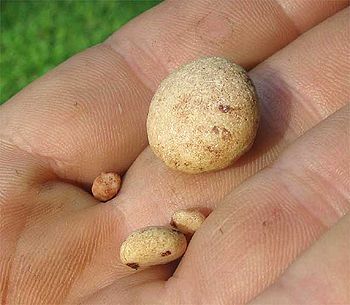
Dog Kidney Stones
Veterinarian Reviewed on November 23, 2012 by Dr. Janice Huntingford
Dog Kidney Stones
Kidney Stones in Dogs
Kidney stones in dogs, or Nephrolithiasis, are characterized by the presence of stones, or renal calculi. The urinary system is responsible for removing liquid wastes from the dog’s body, and since a percentage of the mineral wastes are only a little soluble, crystals might form. When it takes a prolonged time for the crystals to move through the urinary system, interaction might occur, and kidney stones can then be formed.
Kidney Stone Causes
There are many different kinds of stones that can be found in dogs and cats. Usually, each stone type has its very own cause:
- Genetic abnormalities
- Certain supplements or Dog Diet
- Preexisting kidney infection or Dog Urinary Tract Infections
- Specific medication usage
Although kidney stones can form in any dog, there is a slightly higher chance for females to get them, and most of time, the dog is middle aged when they present.
While any breed of dog can get kidney stones, some are predisposed to developing them, like the Miniature Schnauzer, Miniature Poodles, Lhasa Apso, Bichon Frise, Cocker Spaniel, Yorkshire Terrier, and Shih Tzu.
Kidney stones are often the result of concentrated urine and urine retention.
Signs of Kidney Stones
- Pain in the abdomen
- Dog Swollen Abdomen
- Dog Vomiting
- Urinary tract infections that return
- Blood present when urinating
Some dogs might exhibit no symptoms at all, and often when pain is present in the abdomen, it is due to a concurrent urinary tract infection. If dogs have a very severe infection of the kidneys, Dog Kidney Disease or have kidney failure, they might be seriously sick.
How a Diagnosis is Made
- Through doing a biochemical profile
- Performing a bacterial urine culture
- Through the use of X-rays
- Doing a complete blood count
- Performing an excretory urography or ultrasound of the abdomen
Treatment for Kidney Stones
The treatments for kidney stones in dogs will be dependent on the animal. If the kidney stones have been found and are not causing distress, the breakdown of the stones might be attempted through either diet or medicine. If this is attempted, the dog will need to be kept a close watch on, since not every stone might be dissolved.
If the animal is in the midst of kidney failure, or has other signs that are very severe, usually either lithotripsy or surgery will be used. If the dog is found to have concurrent UTIs, then therapy using antibiotics will be recommended. For those animals that are found to be suffering from Dog Dehydration, or are suffering from kidney failure, as well as those with infections which are severe, fluid therapy will then be used.
Pet Care at Home
If you are treating your pet at home with the use of medicine or diet to dissolve kidney stones, the routine has to be followed completely. Dogs cannot eat anything other than what the vet says, since this can undermine the effectiveness of the therapy. Be sure to give the dog all medication, and bring them back to see the vet when instructed. This can insure that the best results are achieved.
Sign up for our newsletter and receive more articles and the latest pet health updates and special offers.
Our Expert
 Dr. Janice Huntingford
Dr. Janice HuntingfordJanice Huntingford, DVM, has been in veterinary practice for over 30 years and has founded two veterinary clinics since receiving her Doctor of Veterinary Medicine at the Ontario Veterinary College, University of Guelph. She has studied extensively in both conventional and holistic modalities. Ask Dr. Jan

